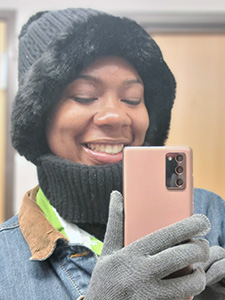
Just weeks after arriving in the U.S. from Jamaica, Trevoniese S. “suddenly was unable to breathe” while at work, collapsed, and had to be rushed to the hospital.
Trevoniese, who has asthma but had not had an asthma attack in more than four years, blacked out again in the ambulance during the scary episode in August.
Fortunately she was okay. After some tests, she was discharged from Cox Barton County Hospital and was sent home. But at age 25, and newly employed with no insurance, Trevoniese was wondering how she was going to pay when she got her hospital bill.
The first bill came weeks later, and it was just $13. “Whoa, that was a breeze!” she initially thought. But more bills soon came, totaling nearly $3,000, and Trevoniese gulped.
“There’s NO way I can pay this – I don’t make this much in a month!” she recalls thinking.
Trevoniese is the mom of a 2-year-old son and is in the U.S. on a nine-month work visa. She works at a theme park near Branson.
“It was driving me up a wall” trying to figure out how to pay the bill, she says. She had called the hospital to apply for financial assistance, but was told that she didn’t qualify, and the hospital recommended a payment plan.
The next day, while looking on TikTok for organizations that might be able to help with hospital bills, Trevoniese came across stories of people who have been helped by Dollar For.
She quickly applied for assistance from her hospital in September, and was approved in November. Her bill amount of $2,774 was cut by $2,358, a reduction of some 85 percent.
“When I got the letter in the mail (that the bill had been forgiven), I remember hopping, skipping and jumping. I was kind of doubting that it was going to happen, but then it happened so quickly. It took less than a month, so it was like a burden lifted off my shoulders, and it still feels that way.”
As someone who’s not from the U.S., Trevoniese wasn’t initially sure that an organization like Dollar For could help her, and she’s sure that many people in her shoes “dreaded to get sick here, we dreaded going to the hospital, we dreaded getting medical attention.
“So even if we do feel ill, we … do not necessarily ignore it, but we try to fight it off on our own instead of getting (the proper) care. Because we are dreading having a hospital bill come in our name.”
It’s estimated that one in four adult Americans avoid seeking medical care due to its cost.
Her advice? “Stop limiting yourself, and get whatever care that you think that you need. Go to the hospital and get financial assistance right after! It’s better, if you’re ill, to go seek medical attention!”
Trevoniese remembers guests at the theme park coming to her aid the day of her health scare. She’s grateful for their help. And she’s considering returning to school – something that would be a lot harder to do with a large hospital bill still left to pay.
